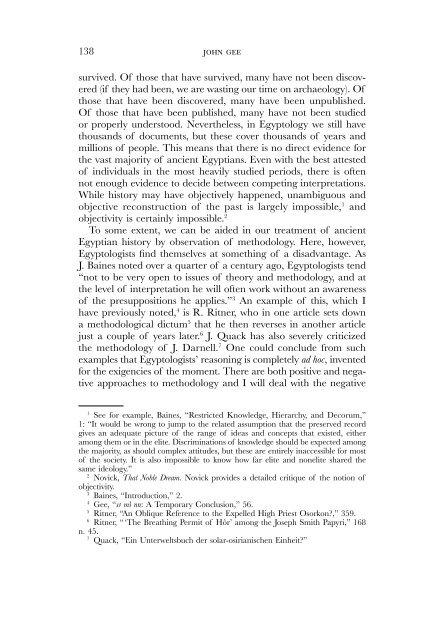Egyptologists' Fallacies - Books and Journals
Egyptologists' Fallacies - Books and Journals
Egyptologists' Fallacies - Books and Journals
You also want an ePaper? Increase the reach of your titles
YUMPU automatically turns print PDFs into web optimized ePapers that Google loves.
138 john gee<br />
survived. Of those that have survived, many have not been discovered<br />
(if they had been, we are wasting our time on archaeology). Of<br />
those that have been discovered, many have been unpublished.<br />
Of those that have been published, many have not been studied<br />
or properly understood. Nevertheless, in Egyptology we still have<br />
thous<strong>and</strong>s of documents, but these cover thous<strong>and</strong>s of years <strong>and</strong><br />
millions of people. This means that there is no direct evidence for<br />
the vast majority of ancient Egyptians. Even with the best attested<br />
of individuals in the most heavily studied periods, there is often<br />
not enough evidence to decide between competing interpretations.<br />
While history may have objectively happened, unambiguous <strong>and</strong><br />
objective reconstruction of the past is largely impossible, 1 <strong>and</strong><br />
objectivity is certainly impossible. 2<br />
To some extent, we can be aided in our treatment of ancient<br />
Egyptian history by observation of methodology. Here, however,<br />
Egyptologists find themselves at something of a disadvantage. As<br />
J. Baines noted over a quarter of a century ago, Egyptologists tend<br />
“not to be very open to issues of theory <strong>and</strong> methodology, <strong>and</strong> at<br />
the level of interpretation he will often work without an awareness<br />
of the presuppositions he applies.” 3 An example of this, which I<br />
have previously noted, 4 is R. Ritner, who in one article sets down<br />
a methodological dictum 5 that he then reverses in another article<br />
just a couple of years later. 6 J. Quack has also severely criticized<br />
the methodology of J. Darnell. 7 One could conclude from such<br />
examples that Egyptologists’ reasoning is completely ad hoc, invented<br />
for the exigencies of the moment. There are both positive <strong>and</strong> negative<br />
approaches to methodology <strong>and</strong> I will deal with the negative<br />
1 See for example, Baines, “Restricted Knowledge, Hierarchy, <strong>and</strong> Decorum,”<br />
1: “It would be wrong to jump to the related assumption that the preserved record<br />
gives an adequate picture of the range of ideas <strong>and</strong> concepts that existed, either<br />
among them or in the elite. Discriminations of knowledge should be expected among<br />
the majority, as should complex attitudes, but these are entirely inaccessible for most<br />
of the society. It is also impossible to know how far elite <strong>and</strong> nonelite shared the<br />
same ideology.”<br />
2 Novick, That Noble Dream. Novick provides a detailed critique of the notion of<br />
objectivity.<br />
3 Baines, “Introduction,” 2.<br />
4 Gee, “s¡ m nn: A Temporary Conclusion,” 56.<br />
5 Ritner, “An Oblique Reference to the Expelled High Priest Osorkon?,” 359.<br />
6 Ritner, “ ‘The Breathing Permit of Hôr’ among the Joseph Smith Papyri,” 168<br />
n. 45.<br />
7 Quack, “Ein Unterweltsbuch der solar-osirianischen Einheit?”









![Am HaSefer [Volk des Buches] - Books and Journals](https://img.yumpu.com/20648352/1/174x260/am-hasefer-volk-des-buches-books-and-journals.jpg?quality=85)







